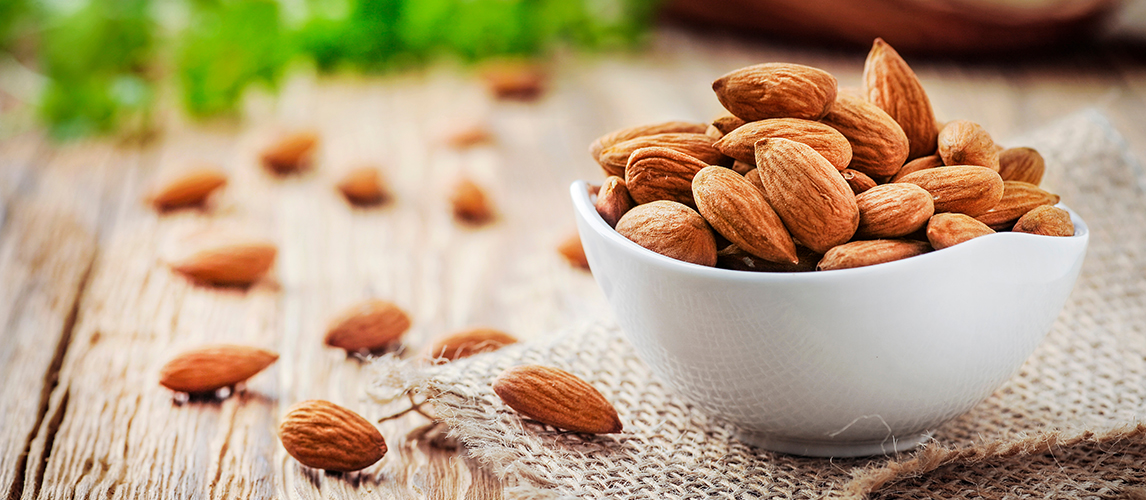As with any food that is considered “human food” you should always be cautious when giving your dog something new to try. A dog’s digestive system isn’t like a human’s, and they process food differently from us. They don’t have the ability to break down certain foods, and trying to eat them can make your pup extremely ill.
Humans can greatly benefit from eating nuts like almonds – they have a lot of health benefits and are a good healthy fat to include in our diets. If you’re worried about how eating almonds might affect your dog’s health, read on and find out all of the information on almonds and dogs.

Can Dogs Eat Almonds?
Ever find yourself wondering “can dogs have almonds?”, well, we’re here to answer this question for you so that there aren’t any food-related mishaps when you’re giving your fluffy friend treats.
Dogs cannot have almonds or any kind of nut that is high in fat (such as brazil nuts and the macadamia nut), high in salt (packaged nuts), or has added artificial flavors. Nuts that are heavily salted, flavored, or contain the substance aflatoxin can be very harmful to your furry friend.
Why are Almonds Bad for Dogs?
There are plenty of reasons to make sure your dog doesn’t eat almonds. These nuts don’t have the same nutritional benefits for canines that they have for humans. Even a few almonds can cause issues.
Avoid feeding your pup any nuts that have high levels of fat or the mildly toxic substance aflatoxin. Humans can mostly digest aflatoxin, which is present in many tree nuts, but dogs have a much harder time of it. As for high levels of fat… Fat aggravates chronic pancreatitis, and salted nuts have the potential to aggravate heart disease in canines and may lead to salt toxicity.
The phosphorus in almonds can also lead to bladder stones or kidney stones. Pups that are genetically predisposed to kidney stones shouldn’t be anywhere near food with high phosphorus levels.
What To Do if Your Dog Eats Almonds
If your dog ate almonds, the actions you take will be based on how many you think they ate. Almonds are only fit for human consumption; there are no almonds for dogs on the market because they contain chemicals that are toxic to our canine companions and can cause all sorts of issues, including an allergic reaction.
One of the most effective treatments is to induce vomiting before your pup’s body can start digesting the nuts. This should be done within the first 30 minutes after they were ingested, and you can call your vet or poison control for guidance. If more time than this has passed, seek veterinary care for immediate supportive treatment.
If your dog consumes an almond or two or maybe gets a sip of almond milk, they should be alright. But, we would still advise contacting your vet because there are too many factors to consider and your pup may have eaten or drank more than you realize.
Symptoms of Gastric Distress
In the event that your dogs have eaten almonds or other food that may have upset their stomach, knowing the symptoms of gastrointestinal upset or distress can help you figure out the best course of action for your canine companions. Gastric distress isn’t always noticeable straight away, but some of the symptoms – such as vomiting – are clear indicators that something is amiss.
- Bloating
- Water retention
- Increased flatulence (more than you’re used to from your pup)
- Increased body temperature
- Constipation or diarrhea
- Vomiting
- Abdominal pain
- Decreased appetite
- Lethargy
In the case that your pup consumes large quantities of almonds or any other nuts that are toxic to them, take your pup to the vet immediately. Human foods like nuts can cause intestinal obstruction, which can be extremely painful and even fatal under some circumstances. Small dogs, like the Yorkshire Terrier, are particularly at risk due to their size.
Your vet may be able to offer your dog pain management medications to help with any symptoms.

Alternative Treats to Give Your Dog
- Carrots
- Apples
- Watermelon
- Chicken
- Eggs
- Plain popcorn
- Peanut butter
- Dog chew sticks
- Dog treats
Nuts That Dogs Can Eat
There are three main types of nuts that your dog should be able to consume without them causing any issues in your dog’s stomach.
Peanuts
Peanuts aren’t actually a nut, but a legume. This is because they grow underground. Peanuts can make a great treat for your dog, as long as they aren’t salted ones because those contain too much salt for a dog’s diet to handle and can cause water retention.
Because nuts can still be a choking hazard for dogs, use peanut butter as a treat instead of a whole nut. Peanut butter is hugely popular with dogs, though one tablespoon does contain the daily fat allowance for a dog that is 42 pounds. Be sure to avoid brands that use xylitol in their peanut butter ingredients.
Cashews
These soft nuts are a great size for your dog to chew on without accidentally swallowing them whole. Feed your dog unshelled cashews in moderation, and make sure to only buy the unsalted and unprocessed kinds of cashew nuts.
The shell of a cashew nut contains urushiol, which is a toxin that may cause a skin reaction in your dog.
Hazelnuts
Hazelnuts are fine to feed your dog, too! They need to be unsalted, uncoated, and unprocessed, but they won’t cause any health issues in your dog.
These nuts are smaller, though, so be aware that small dog breeds may choke on them and large dog breeds may forego chewing them – which they need to do. Don’t leave your dog alone when they’re eating nuts.
Source:
- Anna Burke, Can Dogs Eat Almonds? – AKC







